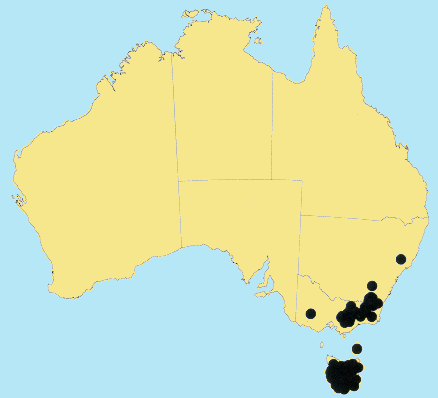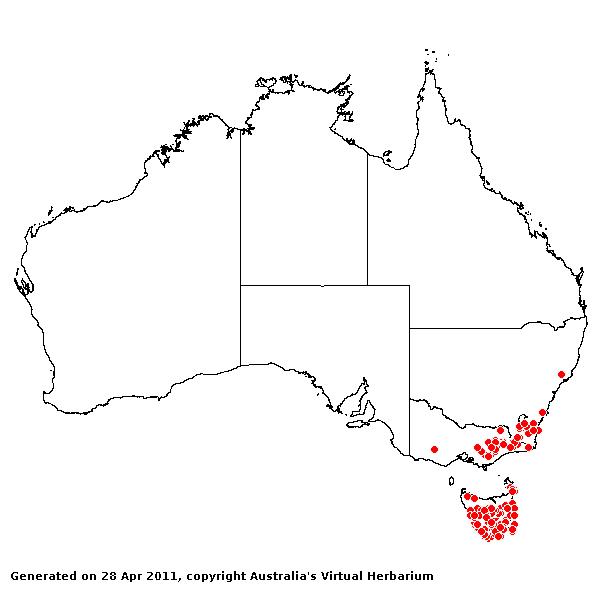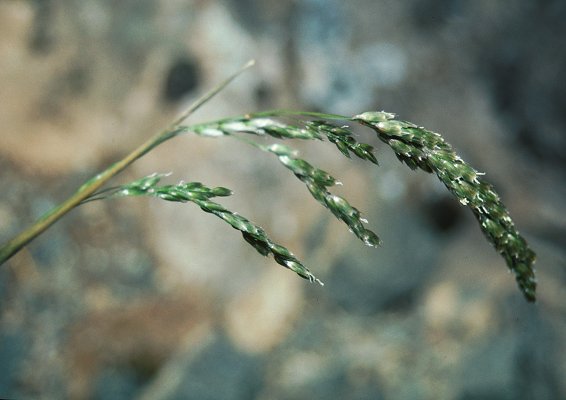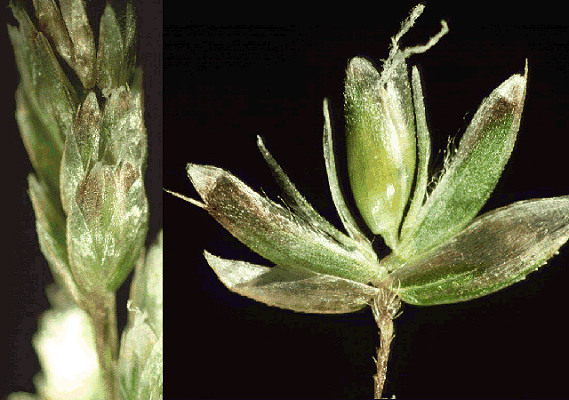Hierochloë redolens (Vahl) Roem. & Schult. Syst. Veg. 2: 514 (1817).
Classification. (GPWG 2001) : Subfamily Pooideae. Tribe Poeae.
Basionym and/or
Replacement Name: Holcus redolens
Vahl, Symb. Bot. 2: 102 (1791).
Type of Basionym or
Protologue Information: HT: [J.R. & G. Forster] Fabricius [misit],
20 Dec. 1774 – 3 Jan. 1775, Terra del Fuego (C; IT: BM-FORST, K (p.p. Tierra del Fuego)). "Vahl index card: Habitat in terra del fuego Prof Fabricius." This
is a Forster collection sent to Vahl by Dr. Fabricius, of Kiel. See Hansen & Wagner, Allertonia 7:
345 (1998). The province of the C specimen has been argued to be New Zealand by
Zotov [who saw a photo] (1973), or Fuegian by De Paula (1975).
Key references
(books and floras): [1810]. R.Brown, Prodromus (209 as H.
antarctica), [1878] G.Bentham, Flora Australiensis 7 (558), [1969]
E.E.Henty, Manual Grasses New Guinea (109), [2002] D.Sharp &
B.K.Simon, AusGrass, Grasses of Australia, [2008] S.W.L.Jacobs, R.D.B.Walley
& D.J.B.Wheeler, Grasses of New South Wales (274), [2009] A.Wilson
(ed.). Flora of Australia,
Vol 44A. Poaceae 2 (141).
Illustrations:
[1984] N.T.Burbidge. rev. S.W.L.Jacobs, Australian Grasses (153), [2008] S.W.L.Jacobs, R.D.B.Whalley
& D.J.B.Wheeler, Grasses of New South Wales, 4th edn (274), [2009].
A.Wilson (ed.), Flora of Australia
44A: Poaceae 2 (148, Fig.22).
Habit.
Perennial. Rhizomes absent or present, short. Culms erect, 36–100 cm tall, 3–5
-noded. Mid-culm nodes glabrous. Lateral branches simple. Ligule an eciliate
membrane, 4–9 mm long, obtuse. Leaf-blades 8–45 cm long, 5–12 mm wide.
Leaf-blade surface scaberulous.
Inflorescence.
Inflorescence compound, a panicle. Panicle lanceolate, 10–20 cm long.
Spikelets.
Spikelets pedicelled. Fertile spikelets 1 or more flowered, with 1 fertile
floret, comprising 2 basal sterile florets, comprising 1 fertile floret(s),
without rachilla extension, oblong or ovate, laterally compressed, 6–9 mm long.
Glumes. Glumes
similar, thinner than fertile lemma, shiny. Lower glume ovate, hyaline, keeled,
1-keeled, 1 -nerved. Upper glume ovate, 5–8.9 mm long, hyaline, keeled,
1-keeled, 3 -nerved. Florets. Basal sterile florets 2 or more, male,
with palea. Lemma of lower sterile floret 100 % of length of spikelet,
chartaceous, 1-keeled, 5 -nerved, awned. Lemma of upper sterile floret entire
or erose or dentate, awned.
Fertile lemma 4–4.5 mm
long, without keel, (3–)5–7 -nerved. Lemma surface indumented. Lemma apex
muticous. Palea 1 -nerved, 1-keeled. Lodicules present. Anthers 2 (bisexual) or
3 (male).
Continental
Distribution: Tropical Asia, Australasia, South America, and Antarctica.
Australian
Distribution: New South Wales, Victoria, Tasmania.
New South Wales: Northern Tablelands,
Southern Tablelands. Victoria: East
Gippsland, Eastern Highlands, Grampians,
Snowfields. Tasmania: North East,
Central Highlands, Ben Lomond, East Coast,
South West, Mt Wellington.
Notes. Native.
S from Barrington
Tops. New Guinea, New Zealand, South America.
Usually in wet subalpine to alpine grasslands, also under light forest. Flowers
Dec.-Feb.






